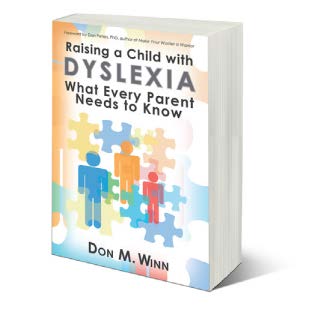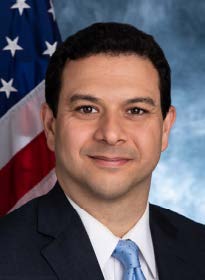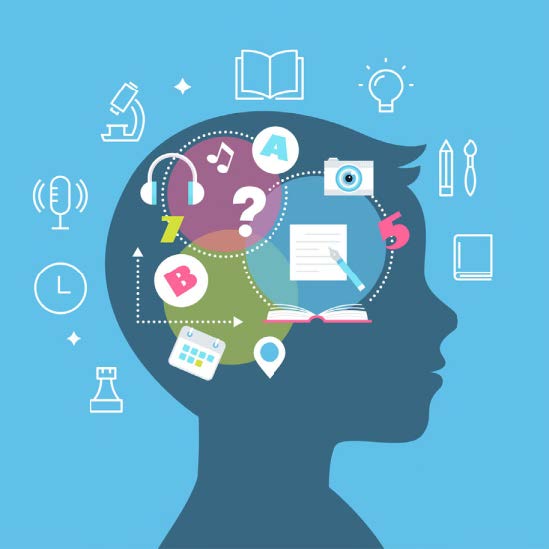WHAT'S HAPPENING
NEW BOOK ON RAISING A CHILD WITH DYSLEXIA
Dyslexia and ADHD challenges can make children feel inadequate, misunderstood, and frustrated both in and out of the classroom. However, teaching children to cope effectively with these challenges will create inner strength and benefits that will empower dyslexic children for their entire lives.

- Title: Raising a Child with Dyslexia: What Every Parent Needs to Know
- Author: Don M. Winn
- Publisher: Cardboard Box Adventures
- Publication Date: September 11, 2019
- Paperback: 262 pages ISBN-13:978-1937615567
- Available at amazon, barnes and noble, cba-books.com/nonfiction.html
Author Don M. Winn explores how learning difficulties affect kids in a number of ways and illustrates how those who care for them can better understand their challenges and cultivate learning and emotional growth. Winn writes from his personal experience as a lifelong dyslexic reader and writer.
Raising a Child with Dyslexia explores: how parents can help their child at home; how grandparents can take part in helping their grandchildren at home; tips on working with your child's school to create an optimal learning environment; symptoms that warrant the diagnosis of a professional; how to offer a safe space for children with dyslexia to learn and grow; specific techniques in helping a child deal with the difficult emotional fallout of dyslexia.
The book includes questions for discussion that parents can use to help their child sort out how they feel about dyslexia and themselves.•
EP MAGAZINE WELCOMES NEW EDITORIAL ADVISORY BOARD MEMBERS
EP Magazine (Exceptional Parent) recently welcomed two distinguished individuals to its Editorial Advisory Board. They are Amged M. Soliman, Esq. and Tera Roberts.

Amged M. Soliman, Esq., is a member of the Maryland State Bar and has spent several years practicing disability rights law. He has lectured on the subjects of disability rights law and administrative law at various conferences and classrooms nationally. Much of Mr. Soliman's work over the years has revolved around examining issues of accessibility for people with intellectual and developmental disabilities, including with respect to medical and dental care, among others. He currently serves as an Attorney-Advisor at the National Council on Disability, an independent federal government agency, and has previously held positions at Franklin & Prokopik and the Law Office of Adele L. Abrams P.C.

Tera Roberts, MPA will assume the position of CEO/Executive Soliman Director of Orange Grove in November 2019 and looks forward to leading this great agency into continued success. She has worked at Orange Grove for the past 24 years and has served as the Director of Adult Services for the past 17 years. Orange Grove serves approximately 1,000 people with disabilities annually, with approximately 750 having intellectual and/or developmental disabilities. Orange Grove employs 900 full-time staff and is governed by a 24-person Board of Directors.
Tera previously worked at several state and non-profit agencies and served as CEO & Founder for four years of The Youth Advantage, providing after-school care for at-risk youth. She has developed numerous programs and departments, with the primary goal of enriching the lives of people in need and people with disabilities. As a lifelong resident of Ringgold, Georgia, one of her most rewarding experiences has been expanding Orange Grove's services into North Georgia. Orange Grove opened their office in Ringgold in 2012 and currently supports more than 100 people in three North Georgia locations. Tera is a member of the Chattanooga Women's Leadership Institute and the Ruritan Club. She graduated from the University of Georgia as a Presidential Scholar. After earning her Bachelors of Social Work, she obtained her Master's in Public Administration from The University of Tennessee at Chattanooga.
NATIONAL COUNCIL ON DISABILITY EXAMINES ORGAN TRANSPLANT DISCRIMINATION
The National Council on Disability (NCD) very recently released the first of five reports in a bioethics and disability series and calls on the U.S. Department of Health and Human Services Office for Civil Rights and the U.S. Department of Justice to issue critical federal guidance on organ transplant discrimination.
This first report titled, Organ Transplant Discrimination Against People with Disabilities, provides an overview of the ways people with disabilities are discriminated against in the organ transplant and procurement processes; an analysis of the protections provided; and the reasons underlying continued discrimination.
"We live in a world where organ denials are based on disability, rather than suitability," said NCD Chairman Neil Romano. "Receiving an organ to save your life should never be jeopardized because of fears, myths, and stereotypes about disability. Especially not with so many federal laws making that practice illegal."
Although federal and state laws ban organ transplant discrimination, people with disabilities are often denied equal access to organ transplants because of discriminatory assumptions that the lives of people with disabilities are of poorer quality than those of people without disabilities, and due to misperceptions about the ability of people with disabilities to comply with post-operative care.
"We call on HHS OCR to demonstrate leadership by issuing critical guidance in this area. It simply cannot wait," said Romano.
Key findings from the report include:
- • If a person has a disability that is unrelated to the reason a person needs an organ transplant, the disability will generally have little or no impact on the likelihood of the transplant being successful. If a person with a disability receives adequate support, the person's disability should also have very limited impact on the ability to adhere to a post-transplant care regimen.
- • Disability-related policies vary greatly across organ transplant centers and across categories of disability. Many centers may have a current or past policy that treats HIV or AIDS, psychiatric disabilities, or intellectual and developmental disabilities (I/DD) as relative or absolute contraindications to transplant.
- • The Americans with Disabilities Act and Section 504 of the Rehabilitation Act prohibit organ transplant centers from discriminating on the basis of disability.
- • Nine states have laws banning organ transplant discrimination.
- • The federally-run system overseen by HHS is called the Organ Procurement and Transplantation Network (OPTN), and it is run by the United Network for Organ Sharing (UNOS) as the sole contractor. UNOS/OPTN has proposed organ procurement policies that pose serious risk to people with disabilities. Existing policies and practices fail to protect people with disabilities from being pressured to donate organs, and some recent OPTN proposals would weaken the few protections that currently exist.
- Key recommendations from the report include:
- • The Department of Justice (DOJ), in conjunction with the Department of Health and Human Services (HHS), should release guidance and provide technical assistance clarifying that Titles II and III of the Americans with Disabilities Act (ADA) and Section 504 of the Rehabilitation Act of 1973 apply to organ transplant centers and hospitals. This guidance and technical assistance should: • Detail the obligations of organ transplant centers and hospitals to avoid discriminating on the basis of disability in the organ tr ansplant process and advise organ transplant centers how to ensure their evaluation of candidates complies with federal law.
- • Emphasize that UNOS/OPTN should ensure that its policies are consistently applied in a manner that avoids discrimination.
- • Explicitly state that making assumptions regarding the post-transplant quality of life for people with disabilities violates federal law.
- • Make clear that the ADA and Section 504 apply throughout the organ transplant process, including informal eligibility determinations, such that disability should only be taken into account to the extent that it can be clearly shown to be likely to impair suc cessful transplantation. • Encourage priority review of any cases brought challenging discrimination on the basis of disability in the organ transplant context in acknowledgment of the time-sensitive nature of a transplant denial.
- • UNOS/OPTN should ensure that individuals and families are able to make informed decisions about the withdrawal of life-sustaining treatment prior to and independent from any contacts from organ procurement organizations.
- NCD's bioethics and disability report series focuses on how historical and current devaluation of the lives of people with disabilities by the medical community, researchers, and health economists perpetuates unequal access to medical care, including lifesaving care. NCD has released/will release its reports in the series on the following schedule:
- • September 25: Organ Transplant Discrimination Against People with Disabilities
- • October 9: The Danger of Assisted Suicide Laws
- • October 23: Genetic Testing and the Rush to Perfection
- • November 6: Quality-Adjusted Life Years and the Devaluation of Life with a Disability
- • November 20: Medical Futility and Disability Bias
OCTOBER IS LEARNING DISABILITY MONTH
Did you know that 2.3 million students are diagnosed with specific learning disabilities (SLD) and receive services under IDEA (Individuals with Disabilities Act)? This represents 35% of all students receiving special education services, according to the Learning Disabilities Association of America.

Children with learning disabilities begin school excited to learn. If your child is having difficulty in school, he/she may learn differently from other kids. For many kids, these disorders go undetected despite their ongoing struggles with school work and the behavior issues that often accompany these disorders. Parents are often the first to notice that "something doesn't seem right." But sometimes knowing what to do and where to find help can be confusing.
A learning disability is not a problem with intelligence or motivation. Kids with learning disabilities are just as smart as everyone else. Their brains are simply wired differently affecting how they receive and process information. If you think your child might have a learning disability, don't despair! There are many steps you can take to ensure that your child gets evaluated appropriately.
WHAT TO DO IF YOU SUSPECT YOUR CHILD HAS A LEARNING DISABILITY
If you suspect that your child is having trouble learning to read, or trouble with learning in general, there is help available. For parents of school-age children, the first source of help should be the public school serving your area. Contact your child's school principal, express your concerns, and ask to have your child evaluated. The school system is required by federal and state law to evaluate your child at no cost to you or your family. The results of the evaluation will show whether or not your child has a problem with reading or learning and, if so, the nature of the problem.
Once your child has received a diagnosis, your school psychologist should be able to recommend and help you set up services or accommodations for your kid. Depending on the specific learning disability, your child may qualify for special education services under the federal Individuals with Disabilities Education Act (IDEA) or accommodations through Section 504 of the Rehabilitation Act.
Keep in mind, you are your child's best advocate. So read books and articles on your child's specific learning disability and learn how you and your school can help. Talk to your kid's teacher about additional ways the teacher can assist your child. Most teachers are eager to help. Although, depending on the student-teacher ratio and the school's resources, it's sometimes challenging for teachers to do as much as they'd like. There are likely other kids in their classroom with special needs as well. If you feel your child isn't getting the help he or she needs, talk to the school administrator. •
[Article contributed by Octopus Watch Motion Edition, the first iconbased watch that empowers kids by teaching good habits and the concept of time, while also encouraging them to stay active with its new fitness tracker. For more information, visit heyjoy.io ]

WIRED DIFFERENTLY : TYPES OF LEARNING DISABILITIES
If you suspect that your child is having trouble with learning in general, there is help available.
DYSLEXIA: Dyslexia is perhaps the best-known learning disability. Children with this disorder may have difficulty with spelling, vocabulary, or comprehension. They may be slow readers, struggle learning left from right, or have organizational problems with both written and spoken language.
DYSGRAPHIA: Dysgraphia affects a child's ability to perform handwriting and other fine motor skills. People with dysgraphia might have problems with inconsistent spacing, difficulty composing writing, poor spelling, illegible handwriting, poor spatial planning on paper, and thinking and writing at the same time.
ADHD: ADHD is one of the most common neurodevelopmental disorders of childhood. It is usually first diagnosed in childhood and often lasts into adulthood. A child has difficulty controlling focus, impulse, energy levels, or some mix of the three.
DYSCALCULIA: A child with this condition may have an effect on one's ability to develop math skills, understand numbers, and learn math-based facts. It can be difficult for individuals with dyscalculia to comprehend math symbols, organize or memorize numbers, tell time, and count.
AUDITORY MEMORY AND PROCESSING DISABILITIES: Kids with this condition may have difficulty recognizing the differences between sounds, understanding the order of sounds, recognizing where sounds have come from, or separating sounds from background noise.
VISUAL PERCEPTUAL/VISUAL MOTOR DEFICIT: These are disorders that can result in missing subtle differences in shapes or printed letters, losing place frequently, struggles with cutting, holding pencil too tightly, or poor eye/hand coordination. Visual Processing Disorders can cause people to struggle with seeing differences between similar letters, number, objects, colors, shapes and patterns.